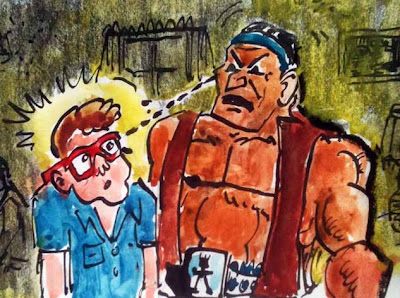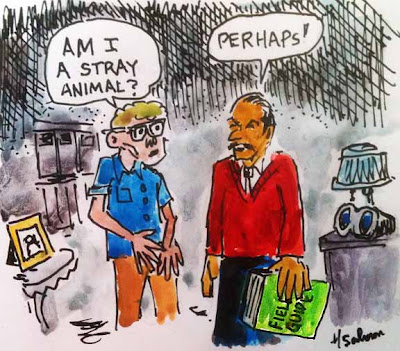Welcome to the continuing serialized version of Phantom Limbs' bassist Jim Parks' novel, Dust Of The Earth, a Tucson story about Tucson history, mystery, other worlds, desert mojo, forbidden love, and the fledgling Tucson music scene... (c) by Jim Parks, reprinted with permission
We last left off with our narrator...He's interviewing Don Pedro. Talk of secret societies, rituals, and emulating the ways of psychedelic indigenous shamanistic tribal people.
We last left off with our narrator...He's interviewing Don Pedro. Talk of secret societies, rituals, and emulating the ways of psychedelic indigenous shamanistic tribal people.
Chapter 15
Mesoamerican anthroplogy at that time was largely the domain of Americans and Europeans, and they were much more interested in the material remains of the great cultures - the pyramids, the hieroglyphics...that sort of thing. We were studying the cultural remains. A decade or two later, our immersion-style investigation would be much more acceptable, desirable in fact. Look at the work of Margaret Mead and Ruth Benedict. Though even their research wasn't participatory. Many decades would pass before participatory anthropology would be accepted - though it would still be controversial and ultimately unreliable. You mentioned being familiar with the works of Carlos Castenada.
Yes! Did you know him too? You seem to know everyone.
Well, I am telling you my life story! [laughs] Which necessarily involves people I know or knew. The list of people I don't know is vastly larger than those I do, just like everyone else. Though admittedly, my list of people known - people of some repute - is longer than most.
So Castenada. I loved those books. But I don't know whether to believe them. I want to. They seem believable. It seems like I could sit in a bus station in Nogales and there would be Don Juan.
Well...it depends on what you mean by true.
I hate answers like that!
[laughs] Part of what seems believable in the books is due to Carlos' familiarity with the geography and culture of the region. He really did travel and study there for many years. He really did speak with the Indians. He really did get to know some of the shamans and became familiar with their practices. He undoubtedly ingested hallucinogenic plants - perhaps even under the guidance of a shaman. But as for the identity of Don Juan...I would say that Don Juan is an amalgamation of several different men he knew. Some shamans, and some men like me...men with knowledge of esoteric Mesoamerican practices and philosophies. And some...well, some...how can I put it...beatnik West Coast counter-cultural Aquarian gurus. [laughs]
So it seems like you knew Castaneda pretty well?
Yes, indeed. We corresponded for many years. And we met regularly. You really shouldn't tell this to anyone. This is off the record, so to speak. For one thing, I have no wish to aggrandize myself. To you is one matter. [laughs] I think you can take it...and take me. And for another thing, I have no wish to harm Carlos. He is a troubled soul. Very...unruhe...as the Germans say.
Honestly, I see much of what I told Carlos put into the mouth of Don Juan. In some ways, I am Don Juan. I honestly do not hold this against Carlos. There is a great literary tradition of this sort of thing. And personally, I think the line between history and fiction is often blurry. It's like watching a magician - the sleight-of-hand kind. You know that you are being fooled, but nevertheless you see something magical. You want to see magic! And as much as the sleight of hand is important, also vital is the communication between the magician and the observer - the banter. This is the power of words.
Carlos has a wonderfully creative mind. And whether or not his stories are literally true, they contain truth. And they contain beauty. Some men, for various reasons, cannot handle the truths of this world. And so they create truths of a better world. Nobler truths.
Ain't that the truth.
Calla te! [laughs] You responded to something in Carlos' stories. It called to you. And this is where the true magic is. When you feel that life is something bigger than our petty activities of the day. And that we can participate in that bigger life. Drugs are an easy passport to this bigger world, but there are dangers -- practical ones, but also, shall we say, existential dangers. They say in Zen that when you reach Nirvana, you realize that Nirvana is what you were doing before you started trying to reach Nirvana! The same, but now different.
That would be a great name for a band: Nirvana.
[laughs] You and your bands!
Yes! Did you know him too? You seem to know everyone.
Well, I am telling you my life story! [laughs] Which necessarily involves people I know or knew. The list of people I don't know is vastly larger than those I do, just like everyone else. Though admittedly, my list of people known - people of some repute - is longer than most.
So Castenada. I loved those books. But I don't know whether to believe them. I want to. They seem believable. It seems like I could sit in a bus station in Nogales and there would be Don Juan.
Well...it depends on what you mean by true.
I hate answers like that!
[laughs] Part of what seems believable in the books is due to Carlos' familiarity with the geography and culture of the region. He really did travel and study there for many years. He really did speak with the Indians. He really did get to know some of the shamans and became familiar with their practices. He undoubtedly ingested hallucinogenic plants - perhaps even under the guidance of a shaman. But as for the identity of Don Juan...I would say that Don Juan is an amalgamation of several different men he knew. Some shamans, and some men like me...men with knowledge of esoteric Mesoamerican practices and philosophies. And some...well, some...how can I put it...beatnik West Coast counter-cultural Aquarian gurus. [laughs]
So it seems like you knew Castaneda pretty well?
Yes, indeed. We corresponded for many years. And we met regularly. You really shouldn't tell this to anyone. This is off the record, so to speak. For one thing, I have no wish to aggrandize myself. To you is one matter. [laughs] I think you can take it...and take me. And for another thing, I have no wish to harm Carlos. He is a troubled soul. Very...unruhe...as the Germans say.
Honestly, I see much of what I told Carlos put into the mouth of Don Juan. In some ways, I am Don Juan. I honestly do not hold this against Carlos. There is a great literary tradition of this sort of thing. And personally, I think the line between history and fiction is often blurry. It's like watching a magician - the sleight-of-hand kind. You know that you are being fooled, but nevertheless you see something magical. You want to see magic! And as much as the sleight of hand is important, also vital is the communication between the magician and the observer - the banter. This is the power of words.
Carlos has a wonderfully creative mind. And whether or not his stories are literally true, they contain truth. And they contain beauty. Some men, for various reasons, cannot handle the truths of this world. And so they create truths of a better world. Nobler truths.
Ain't that the truth.
Calla te! [laughs] You responded to something in Carlos' stories. It called to you. And this is where the true magic is. When you feel that life is something bigger than our petty activities of the day. And that we can participate in that bigger life. Drugs are an easy passport to this bigger world, but there are dangers -- practical ones, but also, shall we say, existential dangers. They say in Zen that when you reach Nirvana, you realize that Nirvana is what you were doing before you started trying to reach Nirvana! The same, but now different.
That would be a great name for a band: Nirvana.
[laughs] You and your bands!
(to be continued...)









